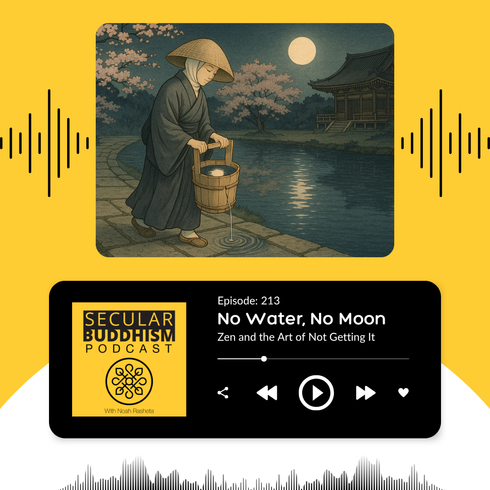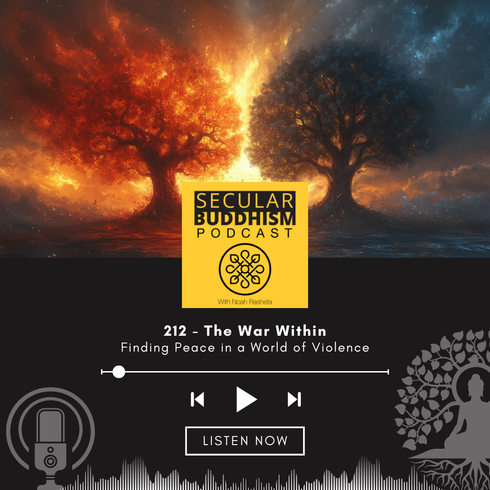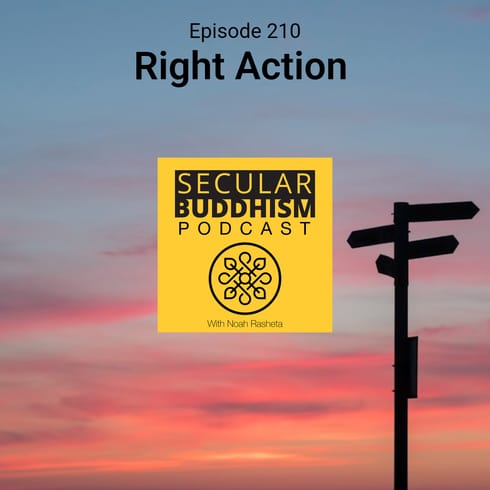
How Avoiding Stress Can Make You Weaker
Below is a summary of the podcast episode. Click the link above to listen to the complete recording.
Life’s unpredictable and volatile nature often subjects us to an emotional rollercoaster ride. In today's world, where polarized views and rapid changes are common, our emotional fragility can lead to unnecessary suffering. However, the wisdom of Buddhist teachings and contemporary psychological theories propose a solution – the development of emotional equanimity and antifragility.
Emotional equanimity isn't about merely weathering life's storms. It's about learning to dance in the rain, to find joy and growth in the very challenges that we face.
Emotional equanimity, a state of calm balance amidst chaos, is one of the four immeasurables in Buddhism. It's not about emotionlessness but maintaining an unwavering state of mind regardless of life's ups and downs. This emotional state is akin to the tranquility of the ocean's depths, which remain undisturbed regardless of the surface storm.
The Buddhist monk, Sona's tale beautifully encapsulates this concept. Sona, who found himself making no progress despite his diligent meditation practice, was advised by Buddha to find a middle way. This middle way is the perfect balance, like a perfectly tuned musical instrument – neither too tight nor too loose. Similarly, we need to find a middle ground to face life's challenges with balance and equanimity.
The Mangala Sutta, one of the oldest and most revered texts in Buddhism, mentions encountering both favorable and unfavorable conditions with equanimity as one of the highest blessings. The paradox of welcoming both favorable and unfavorable circumstances is what strengthens our emotional resilience.
A concept complementary to emotional equanimity is Nassim Nicholas Taleb's idea of antifragility. Unlike the fragile that breaks under stress and the resilient that remains unchanged, the antifragile grows stronger and thrives amidst chaos and volatility. Emotional antifragility suggests that certain stresses and challenges can fortify our emotional resilience.
Neuroscientific and psychological research backs this idea. Studies on neuroplasticity reveal our brains' adaptability in forming new neural connections in response to challenges and stimuli. Stress inoculation, a psychological concept, suggests that controlled exposure to stress can make individuals more resilient to future stress.
By practicing emotional equanimity and antifragility, we not only endure life's challenges but also grow from them. They offer a powerful way to approach life, where we face challenges with a calm, balanced mind and harness them as opportunities for growth.
To cultivate emotional equanimity and growth, here are some practical techniques:
Practice Mindful Breathing: Anchor your emotions and bring yourself back to the present moment by focusing on your breath.
Reflect Instead of React: Before responding to a stressful situation, take a moment to reflect on your potential reaction and its long-term benefits.
Take a Walk: Physical activities like walking can help diffuse emotional tension and provide clarity.
Seek a New Perspective: Try to see your challenges from a zoomed-out or bird's eye view. Widening our perspective can diminish the magnitude of the problem.
Practice Journaling: Reflect on your daily emotional challenges and your responses to them. This exercise can help you handle similar situations better in the future.
As Carl Rogers once said,
The good life is a process, not a state of being. It is a direction, not a destination.
Therefore, in our quest for emotional equanimity and greater resilience, it's essential to remember that it's the journey of continual growth and learning that truly matters. Every challenge, every storm, is nothing but a step on the path moving us in the direction we want to go.
Listen to the full-length (21 minute) podcast episode here:
Click here to read the transcript
Welcome back to another episode of the Secular Buddhism Podcast. Today we're diving into the topic of emotional equanimity and talking about how avoiding life's stresses may inadvertently make us fragile. Have you ever found yourself wishing that life's challenges would simply disappear? Perhaps, with just the right set of circumstances, emotional disturbances could be entirely avoided? If so, today's episode might offer a shift in perspective. What if, instead of evading these challenges, we embraced them, not just endured them, but actually harnessed them to become emotionally stronger? In this episode, we'll explore the Buddhist concept of emotional equanimity a state of calm balance regardless of the chaos around us, and we'll also explore the idea of antifragility. So why this topic? Because in today's world, with its unpredictable nature and rapid changes and polarized views, our emotional fragility is adding a tremendous amount of unnecessary suffering to the normal suffering that we already experience in life. By understanding and practicing emotional equanimity and antifragility, we'll be better equipped to face life's challenges head on, to grow from them, to find a deeper sense of fulfillment and contentment. So, whether you're currently navigating a personal storm or simply preparing for life's inevitable rainy days, this episode is crafted with you in mind.
In Buddhism, equanimity is one of the four immeasurables. It's a state of balance and even-mindedness. It doesn't mean emotionlessness, but rather a calm, unwavering state of mind amidst the ups and downs of life. Imagine the depths of the ocean which remain calm and undisturbed regardless of the storm that's taking place on the surface. And now imagine a mental state that's similar to that. That's the essence of equanimity it's remaining rooted in the piece of equanimity, without being swayed excessively by the winds of joy, sorrow, praise or blame.
There's a well-known tale in Buddhism about a monk named Sona, and Sona was diligent in his meditation but found himself getting nowhere. He reflected on his predicament, likening it to his experience tuning a musical instrument. And if the strings were too tight they could snap, but if they were too loose there would be no sound. The Buddha, understanding his predicament, advised him to find the middle way in his practice, and this story encapsulates the essence of equanimity. We are like the instrument and our strings shouldn't be too tight or too loose. So it's not about avoiding all stresses, nor is it about going looking for all stresses, much like the string too much tension we could snap. But on the flip side, it's important to understand that with not enough tension we can't produce good music. So it's about maintaining that middle ground where we can face life's challenges with greater balance and equanimity.
In the Mangala Sutta, one of the oldest and most revered texts in Buddhism, encountering both favorable and unfavorable conditions with equanimity is considered among the highest blessings. If you think about that for a moment, imagine how it would feel to genuinely welcome both the pleasant and unpleasant experiences in life. That's what the text is about. We typically want to encounter favorable or pleasant things and we definitely don't want to encounter the unfavorable, unpleasant things. This is saying what a blessing it is to be able to welcome both. That's what we're going to look at.
Think of the Tetris analogy for a moment that I talk about. Often Life has pieces that show up, much like the pieces of the game. Sometimes we get really stressed about what piece is coming next and we think, man, I really hope I don't get the square or the L shape or whatever the shape is, or we're longing for it. I really hope I do get this or that shape. Imagine if you weren't caught up in that stress of really wanting the one that you want and really wanting to avoid the one that you don't want, and instead there was open curiosity. I wonder what piece will show up next, that is, the state of equanimity.
Looking at an alternate perspective on this topic, nassim Nicholas Taleb introduces a fascinating concept in his book Anti-Fragile. He speaks of things that gain from disorder. While the fragile breaks under stress and the robust or resilient remains unchanged, the anti-fragile actually grows stronger and thrives in chaos and volatility. Think of it as the difference between a glass cup, a rubber ball and a muscle. The cup shatters if it's dropped. It's fragile. The ball remains unchanged. It's robust or resilient. A bouncy ball, for example you drop it and it bounces back. But a muscle a muscle actually grows stronger with resistance and stress. It's anti-fragile. Not only does the muscle grow stronger through exposure to stress, but it also gets weaker if it's not exposed to stress.
When an astronaut goes into space, they become weightless and their muscles aren't being used and they're no longer under stress. If they remain in that configuration for too long, they come back to Earth quite weak and they have to rehabilitate their muscles. Sometimes they can't even walk when they return. For example, astronaut Scott Kelly, who spent nearly a year in space as part of NASA's TWINS study. When he returned to Earth he experienced muscle atrophy and he needed assistance to get out of the aircraft and rehabilitation to regain his strength and mobility.
Taking this idea to our emotional well-being, it suggests that certain stresses and challenges, rather than breaking us, can actually fortify or strengthen our emotional resilience. But it also suggests that avoiding challenges and stress could weaken us and make us more fragile. Neuroscientific and psychological research supports the idea of emotional anti-fragility. Studies on neuroplasticity have shown that our brains can reorganize themselves, forming new neural connections throughout life. This adaptability isn't just inherent. It's often a response to challenges and stimuli. Similarly, stress inoculation, a concept that's talked about in psychology, suggests that controlled exposure to stress can make individuals more resilient to future stress. It's kind of like a vaccine, where a little bit of the pathogen in this case thinking of stress can actually bolster our defenses for the future.
When we compare the Buddhist concept of equanimity with this modern concept of anti-fragility, I think a beautiful synergy emerges. Both philosophies emphasize not merely enduring or resisting life's challenges, but growing from them. Equanimity teaches us to remain balanced, to neither be overwhelmed by life's storms, but also to not run from them, and anti-fragility, on the other hand, urges us to see these storms as opportunities, catalysts that can make us stronger. Together they propose a powerful way to approach life, where we face challenges with a calm, balanced mind and harness them as opportunities for growth. We encounter situations every day that test our emotional balance and equanimity. Consider the frustrations of being stuck in traffic when you're already late, or receiving unexpected negative feedback at work, or even something as simple as dropping your favorite mug. While the immediate reaction might be anger, anxiety or sadness, these moments present an opportunity, an opportunity to practice equanimity and to cultivate an anti-fragile emotional state. By facing these small daily stressors with a calm mind, we're essentially training our emotional muscles, preparing them for bigger challenges that life might throw at us. And for me, this doesn't mean that we try to suppress whatever emotions we'll experience when we are stuck in traffic, or when we do receive criticism, or when we do lose something that we care about. For me, it means that we welcome whatever emotion appears in that moment.
I've talked about the visualization of the kitchen in the mind, where all emotions, thoughts and feelings are like characters in our mind that come to visit from time to time and they sit at the table. Equanimity is opening the door and allowing them all in. It's the opposite of what many of us have been doing our whole lives, which is try to prevent certain emotions, certain characters, from coming into the kitchen of the mind at all costs. If you're stuck in traffic and you notice frustration arises instead of now being frustrated that you're frustrated or thinking I shouldn't be frustrated, just notice it, acknowledge it, just like you would that character coming into the kitchen of the mind. Oh, frustration, you're here. Okay, now I notice that you're here, I can sit at the table here with you and instead notice how it will go away on its own once the causes and conditions change, the causes and conditions that gave rise to it. When those change, it goes away. And the key, I think, is just to recognize while it's there, what relationship do we have with each of these emotions?
Now I want to share five practical tips, ideas that you can try for practicing emotional equanimity.
The first one is mindful breathing. When you feel overwhelmed or agitated, you can focus on your breath, take a deep, conscious breath and spending time just observing the breath and noticing what it is that you're feeling and where you're feeling it. That can help anchor your emotions and bring you back to the present moment. It's like saying, yes, frustration or anger is sitting here at the table now, but I'm just noticing my breath. I can ask myself what is it that I'm noticing right now? What does it feel like to have this character sitting here at the table? Which emotion is this? Is it the one I think it is, or is it masked? It's another one, it's just being introspective. I like to do that while practicing mindful breathing.
The next tip is to reflect rather than react. Before responding to a stressful situation, just take a moment to reflect and ask yourself the way I want to react. Will my reaction benefit me in the long run? Is this the skillful thing to say or do in this moment? Or perhaps is there a way to turn this challenge that I'm experiencing right now into an opportunity and just be reflective rather than reactive? I think so often an emotion comes into that kitchen of the mind and we immediately go into reactivity mode, where we start picking up the pots and pans and throwing them at whatever emotion is there, because we don't want it to be there. But instead, what if we just reflect and say, huh, okay, this is what I'm experiencing. I wonder why. I wonder why I'm feeling this strong reaction that I'm feeling. Just be reflective with the experience.
The third tip is to simply take a walk, physical activity like walking or really any form of movement. It can help in diffusing the emotional tension that we're experiencing and it provides greater clarity. Sometimes it's while you're out walking and you can be practicing the reflection. Insight may arise. So don't hesitate to take a walk when you need to.
The fourth tip is to seek perspective. When faced with a challenge, try to see it from a zoomed out or bird's eye view. I think often widening our perspective can diminish the magnitude of the problem. I like to do this every time I go flying, because when I'm seeing everything from up high it puts things into perspective, to see the world from up above. If you do this when you're in an airplane, you can look down and you can see a town or a city, and then you think, man, that little car I see on the road down there they have all their thoughts and problems and concerns, but from up here it all just seems so not insignificant, because what we feel matters, but it's reduced. The intensity of what it is feels so much more reduced when we see it from a new perspective. So seek a new perspective.
The fifth tip is to practice journaling. At the end of the day. You could jot down moments where you were feeling emotionally challenged and reflect on how you responded and maybe think about how you could have handled the situation in a similar way or in a different way if you encounter it again in the future. Journaling presents us with the ability to practice reflection, but you can take your time doing it because you're writing. So those are the five tips Mindful breathing, reflect instead of react. Go, take a walk, seek a new perspective and practice daily journaling.
Now I recall a time when I faced a particularly harsh criticism about a project that I was working on and I was passionate about, and my initial reaction was to defend my stance but, taking a moment to breathe and to reflect, I was able to approach the criticism and the critique with curiosity rather than simple defensiveness, which was the first reaction, and this open curiosity not only led to more productive conversation around the topic, but it also allowed me to rethink and refine some of the details of this project that I was so passionate about in ways that I hadn't considered before. So here was a clear challenge, but approaching it with equanimity, I was able to experience growth, and in that growth I recognized my own emotional anti fragility, and I'm sure many, many of you have similar stories or moments or experiences where you were able to turn what felt like a moment of adversity ultimately into an advantage, simply by shifting your perspective. So think of a time when you braved life's weather. How did it shape your emotional landscape? And remember as you do this.
It's not about eliminating the storms from our lives, but it's about finding peace and strength within them. The weather, I think, is a great analogy for this. The weather is an ever-present, ever-shifting force in our day-to-day lives and just as we can't control when a rainstorm might appear, we can't always predict or control life's emotional storms. Yet there's a beauty in this unpredictability the rain, when it comes, it nourishes the earth, it allows life to flourish and in a similar way, our emotional storms can foster emotional growth if we approach them with the right mindset. So to hide away and avoid all rain, sure, it might keep us dry, but it also robs us of the experience, of the lessons and the growth that can come from these events.
Emotional equanimity isn't about merely weathering life's storms. It's about learning to dance in the rain, to find joy and growth in the very challenges that we face. Now, I do want to acknowledge that it may be unskillful to seek out certain storms in life, but it's also unskillful to think that we can go through life without ever experiencing a storm or ever being affected by rain. And I think that's what we do sometimes. We go through life doing everything in our power to control the weather, which we can't do or avoid at all costs any form of storms. And the fact is that in life, storms arise. That's the first noble truth, that's the understanding of the first noble truth. In life, suffering arises, so we don't need to hide away from it. Instead, we can look at these things as opportunities, and equanimity is about occasionally weathering the storm, but it's also about occasionally dancing in the rain.
So, to recap, in this episode I wanted to share some of my thoughts on this Buddhist concept of emotional equanimity. Again, it's a state of balance amidst the ups and downs in life, and I also compared it to the idea of antifragility, where we recognize that challenges and stress not only do they not break us, but they can be the catalyst that makes us stronger and more resistant. Think of the metaphor of exercise, again, the idea of muscles and how muscles grow stronger through resistance as an additional way to visualize this idea of antifragility. So, as you go about your week, I invite you to observe your emotional reactions when a challenge arises, whether it's a big one or a small one, to pause and breathe and ask yourself how can I approach this with greater equanimity? How can this situation, however uncomfortable it might be, be a situation that might actually help me grow, whether it's a disagreement with a colleague, a setback in your personal projects or simply getting caught in the rain, remember, every moment offers an opportunity for emotional growth, and I want to end it with a quote by Carl Rogers, who once said the good life is a process, not a state of being. It is a direction, not a destination.
In our quest for emotional equanimity and greater resilience, it's essential to remember that it's the journey, the continual process of growth and learning that truly matters. It's the moments that we pause and say, in general, I'm headed in the right direction, and recognize that each challenge, each storm along the way is nothing but a step on that path, the path that is moving us in the overall direction that we want to be moving towards. As always, remember you don't need to use what you learn from Buddhism to be a Buddhist. You can use these ideas to be a better, whatever you already are, and thank you for joining me on this exploration of this topic today. I'm wishing you a week filled with emotional equanimity, growth and perhaps the occasional dance in the rain. Thank you for listening. Until next time.



